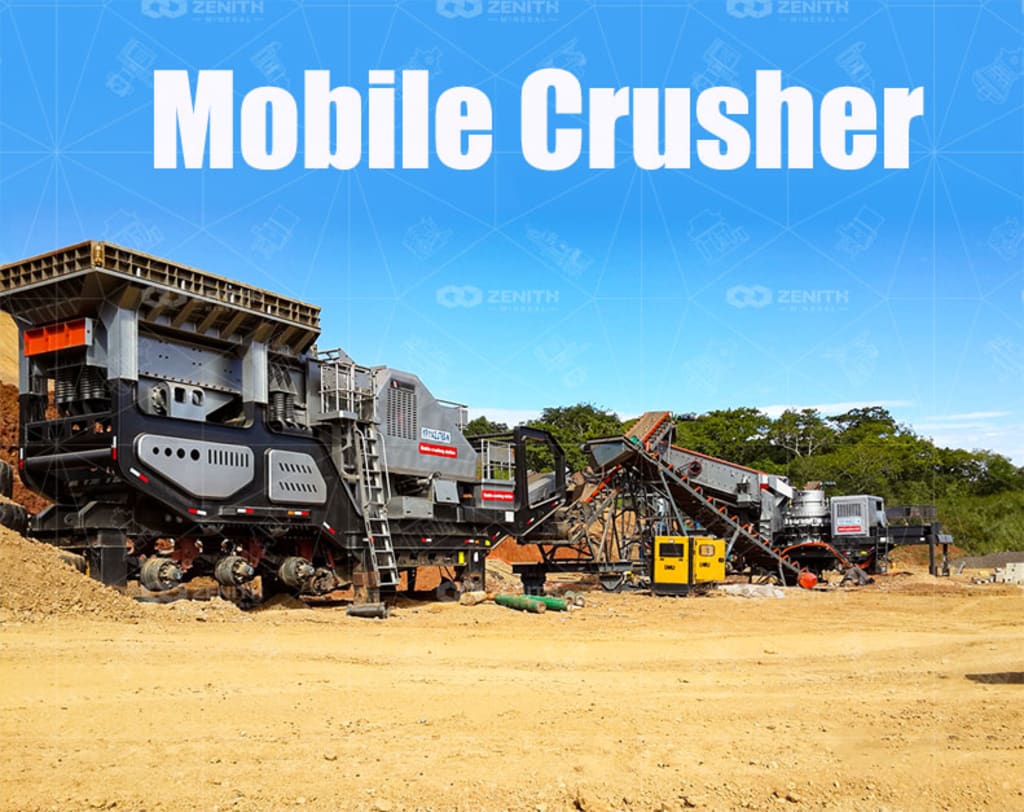
Mobile crushers and stationary crushers are types of machinery used for crushing various types of materials, such as rocks, concrete, and asphalt.
Mobile Crusher is designed to be easily transportable and can be moved from one job site to another as needed. They are typically smaller and more lightweight than stationary crushers and are often equipped with tracks or wheels for easy mobility. Mobile crushers are commonly used in industries such as construction, mining, and demolition to process materials on site.
Mobile crushers come in a variety of sizes and types, ranging from small handheld units to large, heavy-duty machines. Some crushers are designed to be mounted on a trailer or truck, while others are self-contained and can be transported by a single operator.
Most mobile crushers work by using a crushing chamber, which consists of a fixed jaw and a movable jaw. The material to be crushed is fed into the chamber through a hopper or conveyor, and the movable jaw compresses the material against the fixed jaw. The resulting crushed material is then discharged from the chamber and transported away for further processing.
Stationary crushers, on the other hand, are not designed to be moved and are typically larger and more powerful than mobile crushers. They are often located in a fixed location and are used to process larger volumes of materials. Stationary crushers are commonly used in industries such as quarrying, mining, and recycling.
Both types of crushers can come in various sizes and types, depending on the specific needs of the job. They can be equipped with different types of crushing chambers, such as jaw crushers, impact crushers, and cone crushers, to process different types of materials.
Mobile crushers and stationary crushers both have their own advantages and disadvantages, and the choice between the two depends on the specific needs of the job.
Mobile crushers are designed to be portable and can be easily transported to different job sites. This makes them ideal for use in remote locations or areas with limited access to traditional crushing equipment. They are also highly versatile and can be used to process a wide range of materials, from concrete and asphalt to natural stone and even recycled materials. In addition, many mobile crushers are equipped with tracks or wheels, which allows them to move around job sites and navigate uneven terrain.
On the other hand, stationary crushers are typically larger and more powerful than mobile crushers. They are designed to handle larger volumes of material and can be more efficient in terms of crushing capacity. Stationary crushers are also often equipped with advanced features and automation systems, which can further improve their efficiency and ease of use. However, they are not portable and cannot be easily moved to different job sites.
In terms of maintenance, mobile crushers can often be more difficult to maintain than stationary crushers. This is because they have more moving parts and require more frequent lubrication and maintenance. Stationary crushers, on the other hand, are typically easier to maintain because they are located in a fixed location and have fewer moving parts.
In terms of efficiency, mobile crushers have the advantage of being able to move around and work in different locations. This means that they can be used in remote areas or on job sites with limited access to traditional crushing equipment. They are also highly versatile and can be used to process a wide range of materials, from concrete and asphalt to natural stone and even recycled materials.
The choice between a mobile crusher and a stationary crusher ultimately depends on the specific needs of the job and the materials being processed. Mobile crushers are often preferred for their portability and versatility, while stationary crushers may be more efficient for handling large volumes of material in a fixed location.
Overall, the choice between a mobile crusher and a stationary crusher depends on the specific needs of the job. Mobile crushers are ideal for use in remote locations or for processing a wide range of materials, while stationary crushers are more efficient for handling larger volumes of material in a fixed location.





Comments
There are no comments for this story
Be the first to respond and start the conversation.